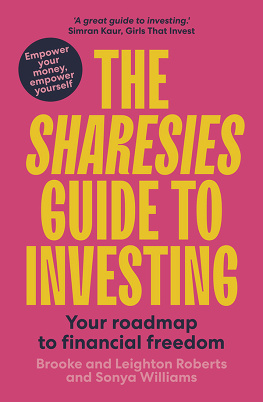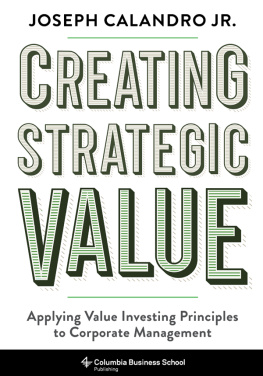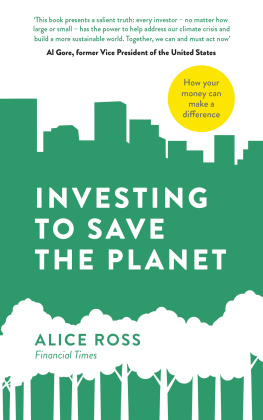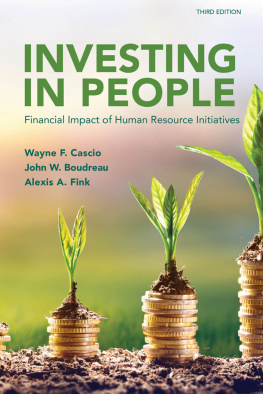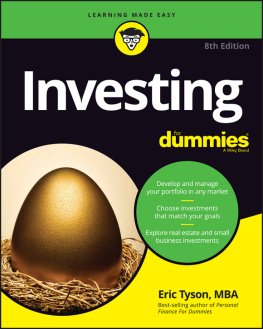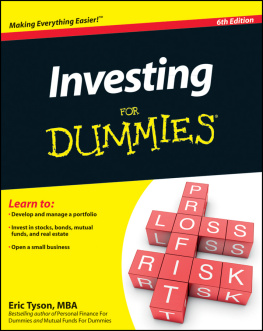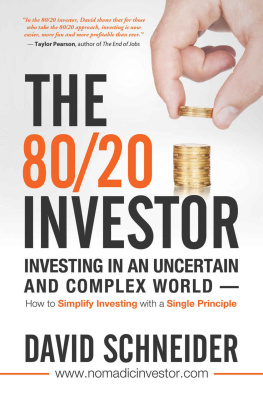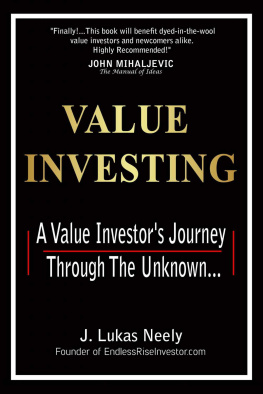Christin ter Braak-Forstinger - Conscious Investing: Practitioners Views on Holistic Investing Approaches That Benefit People and the Planet
Here you can read online Christin ter Braak-Forstinger - Conscious Investing: Practitioners Views on Holistic Investing Approaches That Benefit People and the Planet full text of the book (entire story) in english for free. Download pdf and epub, get meaning, cover and reviews about this ebook. year: 2017, publisher: HarrimanHouse, genre: Romance novel. Description of the work, (preface) as well as reviews are available. Best literature library LitArk.com created for fans of good reading and offers a wide selection of genres:
Romance novel
Science fiction
Adventure
Detective
Science
History
Home and family
Prose
Art
Politics
Computer
Non-fiction
Religion
Business
Children
Humor
Choose a favorite category and find really read worthwhile books. Enjoy immersion in the world of imagination, feel the emotions of the characters or learn something new for yourself, make an fascinating discovery.

- Book:Conscious Investing: Practitioners Views on Holistic Investing Approaches That Benefit People and the Planet
- Author:
- Publisher:HarrimanHouse
- Genre:
- Year:2017
- Rating:4 / 5
- Favourites:Add to favourites
- Your mark:
- 80
- 1
- 2
- 3
- 4
- 5
Conscious Investing: Practitioners Views on Holistic Investing Approaches That Benefit People and the Planet: summary, description and annotation
We offer to read an annotation, description, summary or preface (depends on what the author of the book "Conscious Investing: Practitioners Views on Holistic Investing Approaches That Benefit People and the Planet" wrote himself). If you haven't found the necessary information about the book — write in the comments, we will try to find it.
Christin ter Braak-Forstinger: author's other books
Who wrote Conscious Investing: Practitioners Views on Holistic Investing Approaches That Benefit People and the Planet? Find out the surname, the name of the author of the book and a list of all author's works by series.
Conscious Investing: Practitioners Views on Holistic Investing Approaches That Benefit People and the Planet — read online for free the complete book (whole text) full work
Below is the text of the book, divided by pages. System saving the place of the last page read, allows you to conveniently read the book "Conscious Investing: Practitioners Views on Holistic Investing Approaches That Benefit People and the Planet" online for free, without having to search again every time where you left off. Put a bookmark, and you can go to the page where you finished reading at any time.
Font size:
Interval:
Bookmark:
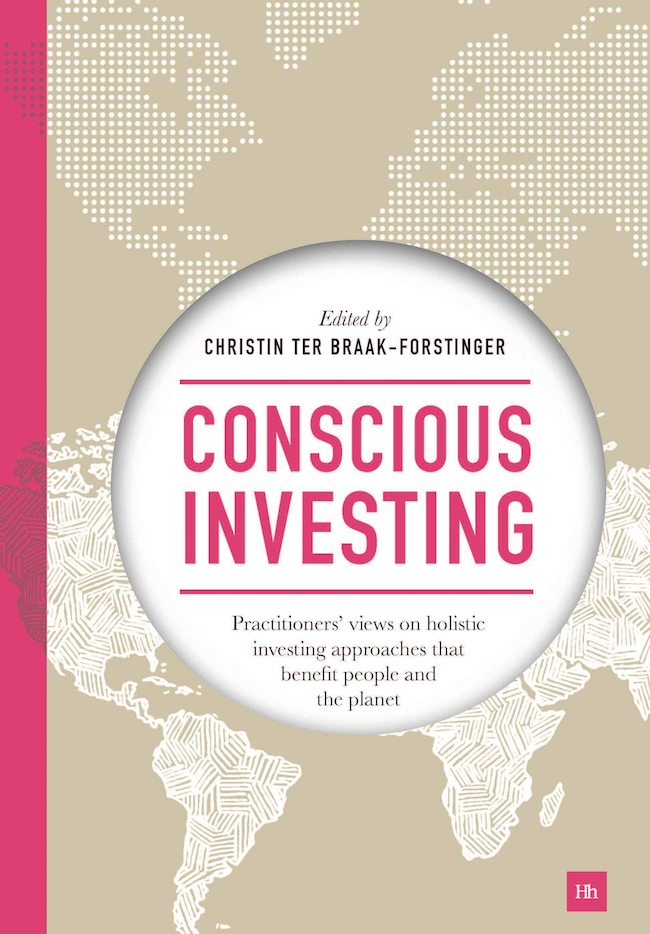
Conscious Investing
Practitioners views on holistic investing approaches that benefit people and the planet
Edited by Christin ter Braak-Forstinger
HARRIMAN HOUSE LTD
18 College Street
Petersfield
Hampshire
GU31 4AD
GREAT BRITAIN
Tel: +44 (0)1730 233870
Email: enquiries@harriman-house.com
Website: www.harriman-house.com
First published in Great Britain in 2017
Copyright Christin ter Braak-Forstinger
The right of Christin ter Braak-Forstinger to be identified as the author has been asserted in accordance with the Copyright, Design and Patents Act 1988.
Hardback ISBN: 978-0-85719-617-0
eBook ISBN: 978-0-85719-618-7
British Library Cataloguing in Publication Data
A CIP catalogue record for this book can be obtained from the British Library.
All rights reserved; no part of this publication may be reproduced, stored in a retrieval system, or transmitted in any form or by any means, electronic, mechanical, photocopying, recording, or otherwise without the prior written permission of the Publisher. This book may not be lent, resold, hired out or otherwise disposed of by way of trade in any form of binding or cover other than that in which it is published without the prior written consent of the Publisher.
Whilst every effort has been made to ensure that information in this book is accurate, no liability can be accepted for any loss incurred in any way whatsoever by any person relying solely on the information contained herein.
No responsibility for loss occasioned to any person or corporate body acting or refraining to act as a result of reading material in this book can be accepted by the Publisher, by the Author, by the Contributors, or by the employers of the Author or Contributors.
Contents
Foreword
By Uli Grabenwarter
I n the light of the collateral damage caused by repeated financial crises which have been triggered by the individualistic (ab-)use of the financial system, associating the term conscious with investing seems a brave concept. Acting consciously in awareness of the consequences for others isnt an investment approach that goes well with the individualistic behaviour of return-driven investing. It certainly doesnt bring to mind a great track record of financial market players in considering societal consequences when pursuing their own objectives.
The term conscious, in suggesting awareness of the consequences of our acts, refers to an intentional, deliberate act, which, with respect to the consequences for other individuals or the society as a whole, in turn suggests premeditation. Premeditation, in criminal law, qualifies as the highest degree of accountability of the author of a given act.
Indeed, taking responsibility is what conscious investing is all about: rather than delegating the societal and environmental impacts caused by us to a legal and regulatory framework that, in prescribing what is allowed and what is not, discharges us of any liability, conscious investing internalises this responsibility into our own decision perimeter.
Why would you opt for that accountability? Isnt it limiting your choices? Doesnt it give others the option of taking a free ride on opportunities you disregard because of ethical, social or environmental concerns? Doesnt it make other market players rich while you forgo the best opportunities to make money?
Morality in financial markets, and in business in general, will never be a voluntarily subscribed code of ethical standards. News in the media every day reminds us that the dream of Kants categorical imperative one day being internalised in financial market behaviours such that financial market regulation and supervision become redundant is a very distant scenario.
Yet, conscious investing is not a hobby of nave daydreamers.
If this book brings together the contribution of pioneers in impact investing reflecting on conscious investing, it is in full awareness of, or even in response to, very concrete market realities.
They are based on the observation that the magnitude of negative societal spill-over effects of self-centric behaviour of market players in the financial system are creating tangible costs, not only to distant stakeholders in our societal system. These spill-over effects also increase individual investments risk and destroy economic value for investors; and in doing so, they erode the sustainability of a whole system on which we are basing our lifestyle, our concepts of social security, our retirement schemes, and every single dimension of our expectations on quality of life.
The trade-off between individualistic maximisation of profit and societal well-being is at the roots of capitalism. This fact is not about to change. However, the global financial crisis in 2008 has brought about the emergence of a widespread resistance from a large spectrum of stakeholders of economic life to the collateral damage that the traditional pursuit of personal wealth at the expense of others entails.
Amongst the claims of this matured stakeholder community is the call for a more conscious way of using the power of capital to serve societal needs, not at the detriment of individual well-being, but as a prerequisite for the sustainability of personal wealth.
In this book, practitioners of the impact investing industry debate various concepts for combining individual and societal prosperity in a wide spectrum of investment approaches. They reverse engineer and dismantle concepts that made us procrastinate in obsolete, wrong-proven financial market logic to guide you to ways of creating personal wealth that do not come at the expense of others.
This being said, conscious investing is not about inventing a new drug that makes you feel happy about the way you earn money. However important our awareness of the societal impact we create may be to put our own conscience at peace, it is only the starting point in a systemic change required to secure the sustainability of our society.
The need to reflect on how we can carry the essence of such investment approaches to the increasing number of stakeholders that are marginalised by our economic system has become indispensible. Again, this is not a concept of charity, but a matter of systemic interaction: the increased interconnectivity of our world no longer allows us to confine social, environmental, demographic and political threats inside boundaries defined by our own comfort. If we are unable to deal with these challenges at distance, they will come to us: in the form of refugee streams, natural disaster patterns, war activity, epidemic diseases, terrorist activity news stories in the media tell it all.
Whatever conviction we gain of the importance of holistic investment approaches, impact-minded investing and moral standards we want to apply, this book is an invitation to think beyond the microcosmos of our own prosperity. You may take up this innovation for many reasons: because of your good heart, or because of fear based on sheer logic about where we are headed to; you may be part of those who look at increasing business risks because of social tensions, modified consumer behaviour, limited natural resources, natural disaster risk and similar; or you may be part of those who, based on humanitarian values, care about this planet.
Whatever reason you choose, they all are valid and share the same degree of urgency. And they will lead to the same result.
Happy reading and safe travels on your journey!
About Uli Grabenwarter
Uli Grabenwarter, is Deputy Director Equity Investments at European Investment Fund (EIF). In this capacity he oversees EIFs activities in Impact Investing, Technology Transfer and Venture Capital, with EIF being Europes biggest Fund-of-Funds Investment platform in that space. Previously he was responsible for EIFs strategic development in the equity space and in this context has led the build-up of the Social Impact Accelerator, the first pan-European social impact investing fund-of-funds. From 2010 to 2012 he conducted a 20-month research project on impact investing in collaboration with IESE University of Navarra in Barcelona and the Family Office Circle Foundation based in Switzerland, analysing best-market-practices for impact investing in the private equity and venture capital space. He is a visiting Professor for Private Equity and Venture Capital at IESE University. He regularly publishes articles and white papers on venture capital and impact investing. Uli is also chair of the European Impact Investing Luxembourg think-tank platform (www.eill.lu) and member of several expert groups on impact investing and impact metrics across Europe. Uli holds a Masters degree in Business and Finance of the University of Graz.
Font size:
Interval:
Bookmark:
Similar books «Conscious Investing: Practitioners Views on Holistic Investing Approaches That Benefit People and the Planet»
Look at similar books to Conscious Investing: Practitioners Views on Holistic Investing Approaches That Benefit People and the Planet. We have selected literature similar in name and meaning in the hope of providing readers with more options to find new, interesting, not yet read works.
Discussion, reviews of the book Conscious Investing: Practitioners Views on Holistic Investing Approaches That Benefit People and the Planet and just readers' own opinions. Leave your comments, write what you think about the work, its meaning or the main characters. Specify what exactly you liked and what you didn't like, and why you think so.

